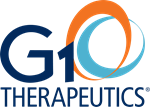New Publication Highlights Real World Impact of Trilaciclib on Myelosuppressive Events in Patients with Extensive Stage Small Cell Lung Cancer (ES-SCLC)
- Results Confirm that Trilaciclib Reduces Single and Multilineage Grade ≥3 Myelosuppressive Hematologic Adverse Events (HAEs) Including Neutropenia, Anemia, and Thrombocytopenia -
- Analyses Showed Consistently Lower Cytopenia-Related Healthcare Utilization and All-Cause Hospitalization Among Patients Receiving Trilaciclib –
RESEARCH TRIANGLE PARK, N.C., July 31, 2023 (GLOBE NEWSWIRE) -- G1 Therapeutics, Inc. (Nasdaq: GTHX), a commercial-stage oncology company, today announced the publication of real world outcomes data from published and new unpublished studies showing the potential of trilaciclib to reduce single and multilineage myelosuppressive events associated with chemotherapy, cytopenia-related healthcare utilization, and hospitalizations in adults being treated for extensive stage small cell lung cancer (ES-SCLC). This review of real-world experience with trilaciclib was published in Advanced Therapy.
“This review provides important evidence of the broad benefit of trilaciclib utilization among patients with ES-SCLC to support treatment decisions,” said Dr. Jerome Goldschmidt, Medical Oncologist with the Blue Ridge Cancer Center in Blacksburg, VA and the U.S. Oncology Network and lead author of the study. “The findings add to the growing body of evidence supporting the benefits of trilaciclib that were demonstrated in the clinical trials that led to its approval. The effect of trilaciclib on reducing grade 3 and 4 myelosuppressive HAEs as well as dose reduction and treatment delay should translate into improved clinical outcomes and QoL among these patients. Moreover, potential reduction in cytopenia-related healthcare utilization and hospitalizations may alleviate overall burden of ES-SCLC on healthcare systems.”
The publication, entitled, “Real-World Outcomes of Trilaciclib Among Patients with Extensive-Stage Small Cell Lung Cancer Receiving Chemotherapy,” was the result of a comprehensive literature review and synthesized published and new unpublished real-world studies of trilaciclib-treated and comparable non-trilaciclib-treated patients with ES-SCLC. Outcomes were compared qualitatively between the trilaciclib and historical non-trilaciclib reference groups, and between first line trilaciclib initiators and the overall trilaciclib population.
Existing real-world studies in ES-SCLC consistently demonstrate that trilaciclib-treated patients had numerically lower prevalence of single and multilineage grade ≥ 3 myelosuppressive HAEs and lower cytopenia-related healthcare utilization, in reference to comparable historical non-trilaciclib cohorts. The real-world outcomes associated with trilaciclib are consistent with clinical trials, despite a higher proportion of elderly population, poorer performance status, and variation in timing of initiation of trilaciclib in real-world studies.
- In all trilaciclib cohorts, the weighted average prevalence of grade ≥ 3 myelosuppressive HAEs in ≥ 1 lineage, ≥ 2 lineages, and all three lineages was 40.5%, 14.5%, and 7.5%, respectively. All rates were numerically lower compared to the historical non-trilaciclib cohorts (58.8%, 28.0%, 13.0% respectively).
- Cytopenia-related healthcare utilization was lower in the trilaciclib cohorts. Trilaciclib patients also had numerically fewer all-cause hospitalizations and shorter length of stay in reference to the historical non-trilaciclib patients.
- In general, first-line trilaciclib initiators had numerically even lower myelosuppressive HAEs (grade ≥ 3 myelosuppressive HAEs in ≥ 1, ≥ 2, and all three lineages was 33.5%, 6.0%, and 5.5%, respectively) and also lower cytopenia-related healthcare utilization than the overall trilaciclib patients.
- Dose reduction and treatment delay were also evaluated in certain of the reviewed studies. Lower average rates of dose reduction and treatment delays were observed among patients receiving trilaciclib in reference to the historical non-trilaciclib cohorts.
The publication can be found on the G1 website here.
About Small Cell Lung Cancer
In the United States, approximately 30,000 small cell lung cancer patients are treated annually. SCLC, one of the two main types of lung cancer, accounts for approximately 14% of all lung cancers. SCLC is an aggressive disease and tends to grow and spread faster than NSCLC. It is usually asymptomatic; once symptoms do appear, it often indicates that the cancer has spread to other parts of the body. About 70% of people with SCLC will have cancer that has metastasized at the time they are diagnosed. The severity of symptoms usually increases with increased cancer growth and spread. From the time of diagnosis, the general 5-year survival rate for people with SCLC is 6%. The five-year survival rates for limited-stage (the cancer is confined to one side of the chest) SCLC is 12% to 15%, and for extensive stage (cancer has spread to the other lung and beyond), survival rates are less than 2%. Chemotherapy is the most common treatment for ES-SCLC.
About G1 Therapeutics
G1 Therapeutics, Inc. is a commercial-stage biopharmaceutical company focused on the development and commercialization of next generation therapies that improve the lives of those affected by cancer, including the Company’s first commercial product, COSELA® (trilaciclib). G1 has a deep clinical pipeline and is executing a development plan evaluating trilaciclib in a variety of solid tumors, including breast, lung, and bladder cancers. G1 Therapeutics is based in Research Triangle Park, N.C. For additional information, please visit www.g1therapeutics.com and follow us on Twitter @G1Therapeutics.
G1 Therapeutics® and the G1 Therapeutics logo and COSELA® and the COSELA logo are trademarks of G1 Therapeutics, Inc.
Forward-Looking Statements
This press release contains forward-looking statements within the meaning of the Private Securities Litigation Reform Act of 1995. Words such as "may," "will," "expect," "plan," "anticipate," "estimate," "intend" and similar expressions (as well as other words or expressions referencing future events, conditions or circumstances) are intended to identify forward-looking statements. Forward-looking statements in this press release include, but are not limited to, that trilaciclib may reduce single and multilineage grade ≥ 3 myelosuppressive HAEs and cytopenia-related healthcare utilization among patients with ES-SCLC in the real world, that utilization of trilaciclib may translate into improved clinical outcomes and QoL among these patients, and that usage may alleviate overall burden of ES-SCLC on healthcare systems, are based on the company’s expectations and assumptions as of the date of this press release. Each of these forward-looking statements involves risks and uncertainties. Factors that may cause the company’s actual results to differ from those expressed or implied in the forward-looking statements in this press release are discussed in the company’s filings with the U.S. Securities and Exchange Commission, including the "Risk Factors" sections contained therein and include, but are not limited to, the company’s dependence on the commercial success of COSELA (trilaciclib); the development and commercialization of new drug products is highly competitive; the company’s ability to complete clinical trials for, obtain approvals for and commercialize any of its product candidates; the company’s initial success in ongoing clinical trials may not be indicative of results obtained when these trials are completed or in later stage trials; the inherent uncertainties associated with developing new products or technologies and operating as a commercial-stage company; and market conditions. Except as required by law, the company assumes no obligation to update any forward-looking statements contained herein to reflect any change in expectations, even as new information becomes available.
G1 Therapeutics Contact:
Will Roberts
Communications Officer
Vice President, Investor Relations & Corporate Communications
919-907-1944
wroberts@g1therapeutics.com

More News
View More




Recent Quotes
View More
Quotes delayed at least 20 minutes.
By accessing this page, you agree to the Privacy Policy and Terms Of Service.
